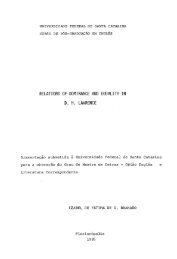memórias de parteiras - Repositório Institucional da UFSC
memórias de parteiras - Repositório Institucional da UFSC
memórias de parteiras - Repositório Institucional da UFSC
You also want an ePaper? Increase the reach of your titles
YUMPU automatically turns print PDFs into web optimized ePapers that Google loves.
ABSTRACT<br />
This study aims at retrieving from midwives’s memories a job that has been historically<br />
related to a female practice. It tries to approach this job to what has been proposed these <strong>da</strong>ys<br />
as “humanization of parturition”. It <strong>de</strong>als with a qualitative study that ma<strong>de</strong> use of the Theme<br />
Oral History as a method of un<strong>de</strong>rstanding the <strong>da</strong>ta. Following the ten<strong>de</strong>ncy of several current<br />
oral historians, the narratives collected from interviews were presented in its totality and<br />
transcribed by the author, in an attempt of keeping all the strength and singularity inclu<strong>de</strong>d in<br />
such speech. Seven collaborators participated in the research: three of them from the state of<br />
Santa Catarina and four from northern Minas Gerais. The colony was ma<strong>de</strong> up of women that,<br />
throughout the period of time between the <strong>de</strong>ca<strong>de</strong>s of forty and eighty, <strong>de</strong>dicated to <strong>de</strong>livering<br />
in either private houses or hospitals, no matter how they were taught to do it. Aiming at<br />
unfolding the i<strong>de</strong>al inclu<strong>de</strong>d in the narrative concerning a gen<strong>de</strong>r basis, the study analized<br />
some aspects that were codified as “sites of meanings” which were: the midwives’s profile;<br />
how and where they used to <strong>de</strong>liver; vocation; care; humanization and ethics. The collected<br />
<strong>da</strong>ta shows a job that was already quite linked to medical knowledge and mixed with common<br />
sense un<strong>de</strong>rstanding learned from other women, specially when the midwives didn’t have<br />
formal education. Moreover the majority of them were directly or indirectly connected to<br />
nursing. It is clear through the confirmation of some stereotypes concerning gen<strong>de</strong>r (in which<br />
the female work is strongly assossiated to private houses) that their job is <strong>de</strong>preciated –<br />
specially when it comes to salary and importance. The view on midwives as ignorant women<br />
is overcome. Besi<strong>de</strong>s, it becomes evi<strong>de</strong>nt that humanization also <strong>de</strong>mands the healthcare<br />
workers’s <strong>de</strong>dication about the new political-philosophical perspective of care that is taken by<br />
non-physicians during parturition.

















